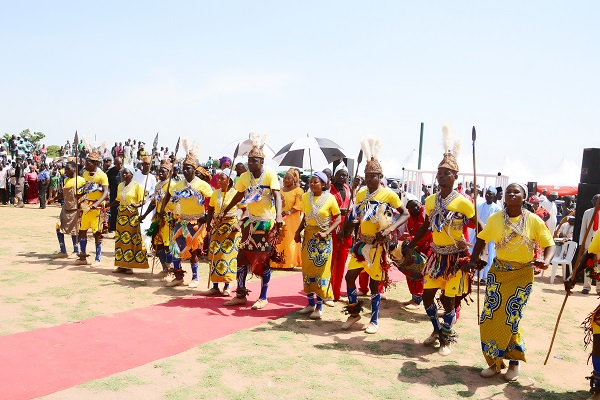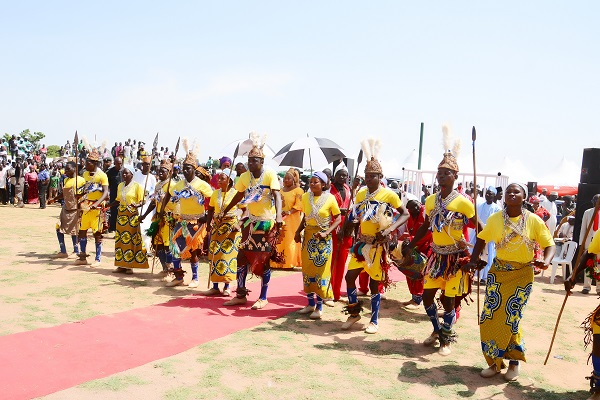The Tangale tribe is one of the tribes in Northern Nigeria, located in Gombe state. According to some sources, the Tangale people got their name from “Tangal”, a chief of Billiri, in the present Gombe state of Nigeria. It is believed that Tangal was instrumental in organizing the clans under his leadership and because of this, the people under him were referred to as the Tangale (as it was customary in many African communities to name a land or ethnic group after their leader).[1]
History of Settlement: Historical claims are that the Tangale people are migrants from Yemen through Egypt and then to the present Borno state. However, due to constant inter-tribal conflicts,they had to keep migrating from one place to another. They settled in at least seven different locations before they came to their presently known settlement. A list of some of those places the settled at include;SanumKude (also known as Big San) near Ngazargamu and Kupto. Kupto was like the Biblical ‘Corinth’; a place were different tribes and groups came together to co-exist and co-habit. At Kupto, the Tangale’s lived together with the Lunguda, Kare-Kare, Tera, Waja, Bolewa, Songom and other neighbouring tribes. It was from Kupto that they further migrated to find new shelter; mostly mountainous areas which most felt were safer from the frequent raids and attacks they encountered from marauders.

Language and Religious Inclinations: The Tangale tribe speak a language that is also called ‘Tangale’. But because of the location of the tribe in Northern Nigeria, a good population also speak the Hausa language fluently.A majority of the Tangale speaking people are found across areas like Ture, Kwame, Billiri, Kaltungo and Shongom in Gombe state. As regards their religious beliefs, an overwhelming population is Christian, with a small percentage practicing Islam and African Traditional Religion.
Dressing: In times past, most Africans dressed in animal skins, especially the males, with the females dressing in like manner or using knitted leaves to cover certain parts of their bodies. The Tangale tribe was no exception. In modern times and with the advent of technology however, fabrics and textiles have taken over.
Food: The Tangale tribe has certain unique delicacies. One of these is a special soup called ‘Arbayo’. This soup is made with ‘daddawa’-a traditional form of Seasoning like Maggi, but prepared from the locust bean seed. This soup is the special delicacy of the Tangale of the Kaltungo extraction. Another delicacy is the ‘Ed Mammu’, which is prepared with Guinea corn and grounded beni seed. Other delicacies include ‘Kwaksak’ and ‘Shinga’. There are certain fruits that are of great interest to the Tangale tribe; fruits like ‘langdongdong’, ‘wulot’,’kwalak’, ‘la awe’, ‘sha we’, ‘tuje’etc. which forms part of the desserts for typical Tangale table. The Tangale tribe are meat lovers too, given that they had/have an ancestry line of hunting and livestock farming. The average Tangale person makes no distinction in the selection of the meat they consume, with some having a voracious appetite for pork and dog meat too.

Festivals:The Tangale tribe has two very important festivals; the Eku Festival and the Tangra Festival. The Eku festival is usually celebrated as a harvest festival while the Tangra festival is usually done in preparation for the planting season. There are also festivals related to hunting expeditions, though in recent times, such a festival has been declining from prominence. Another festival of importance to the Tangale people is the marriage festival, which is usually elaborate and of great significance to the Tangale people. Attention is also paid to festivals related to the demise of loved ones.
Tangale Economy:The mainstay of the Tangale economy is Agriculture; they farm the following crops in commercial quantities; guinea corn, maize, groundnut and beans. They also cultivate rice but on a much smaller scale, accompanied with livestock farming. There is also huge presence of local or small scale trading amongst the Tangale people.
Traditional Leadership Structure: The Tangale people are divided into seven major clans-Bangaje, Kalmai, Nathe, Tal, Tanglang, Tangaltonga and Todi- each with their own chief. These clan chiefs in turn submit to the Paramount ruler of the Tangale people. The paramount ruler of the Tangale people is referred to as the Mai TangalemKude (The Big Tangale Chief). The current Chief’s palace is in Billiri, Gombe state.
Interesting to know is the fact that, some researches have ranked the Tangale tribe amongst the first twenty one major ethnic groups and languages of Nigeria.[2]
[1] ‘A Brief History of the Tangale People’ in ‘Teach yourself the Tangale Language’,Samaila Kure. www.kalkwi.tripod.com/tangale_people/history.htm accessed 04-11-2018.
[2]http://www.britannica.com/EBchecked/topic/582425/tangale Accessed 05-11-2018.


